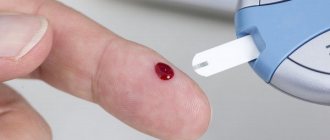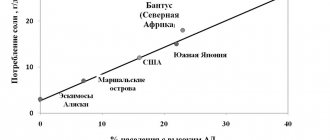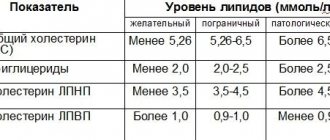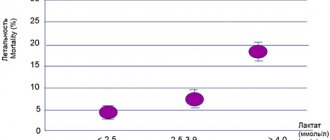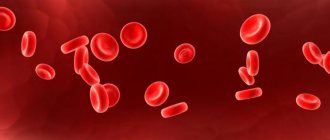How does low blood sugar affect the body?
Normal blood sugar levels may fluctuate throughout the day, but not significantly.
But blood sugar levels that are too high or too low can cause health problems. Low blood sugar, or hypoglycemia, occurs when blood sugar levels become too low. And a recent article notes that hypoglycemia most often occurs due to certain medications, especially for diabetes. However, there are other possible reasons.
In this article, we'll learn what low blood sugar is, how it affects the body, and when to see a doctor.
Causes of hypoglycemia
The causes of hypoglycemia in diabetes are too high, inappropriate doses of insulin, as well as the use of harmful medications for type 2 diabetes. If blood sugar drops, the pancreas immediately stops releasing insulin. However, you cannot stop the action of insulin that was injected, as well as diabetes pills. You have to wait many hours for your kidneys and liver to clear these drugs.
Hypoglycemia occurs when there is a lot of insulin in the body, but not enough sources of glucose. In the liver, glucose is compactly stored in the form of glycogen. Reserves of this substance may be depleted. A diabetic may make a mistake with the dose of insulin or tablets that stimulate the release of insulin by the pancreas. In this case, there will not be enough glucose to compensate for the action of insulin that circulates in the blood. Sometimes it happens that a patient took his usual dose of diabetes medications, but for some reason his body’s sensitivity to insulin and pills increased, and this caused hypoglycemia.
A low-carbohydrate diet relieves severe hypoglycemia
Here are the typical reasons:
- Overdosing on insulin or pills due to lack of diabetes self-management skills.
- Inexperience of parents of diabetic children, their lack of skills in diluting insulin.
- Malfunction of the insulin pen, which led to an overdose.
- An inaccurate glucometer that produces readings that are significantly higher than real ones.
- Intentional overdose for suicidal or manipulative purposes.
- Error in dosage recalculation when changing insulin drug.
- Slow elimination of insulin from the body due to renal or liver failure.
- Incorrect technique for administering insulin - injection too deep, massage of the injection site.
- The effect of sulfonylurea derivatives was enhanced by some other medications.
- Sensitivity to insulin and pills increased due to physical activity.
- The insulin dose was not reduced in the first trimester of pregnancy or during breastfeeding.
- Insulin sensitivity increased in a woman after childbirth.
- When losing body weight, use insulin or tablets without reducing dosages.
- Impaired movement of food from the stomach to the intestines (diabetic gastroparesis).
- Impaired digestion of food due to gastroenterological diseases.
Cause of hypoglycemia: alcohol
Alcohol abuse is a common cause of dangerous hypoglycemia. In a normal situation, in response to a decrease in sugar, the liver breaks down glycogen and releases glucose into the blood. However, taking large doses of alcohol blocks this process. A standard safe dose of insulin or type 2 diabetes pills combined with heavy drinking can cause severe hypoglycemia. Moreover, others will think that the patient fell asleep due to intoxication. They will not realize that the person requires emergency medical care.
Diabetics who inject insulin or take strong pills for type 2 diabetes should absolutely not get drunk. Alcoholic hypoglycemia is a common cause of death and permanent brain damage. However, drinking alcohol in moderation is generally allowed. Read the article “Alcohol for Diabetes” for more details.
Causes of low sugar in healthy people
Low sugar can sometimes occur in healthy people who do not inject themselves with insulin or take diabetes pills. Possible reasons:
- Fasting, following a low-calorie semi-starvation diet.
- Meals overloaded with carbohydrates.
- Liver problems caused by alcoholism or hepatitis.
- Rare diseases.
An obvious cause of low sugar in healthy people is fasting and semi-starvation. However, in practice, a more common reason is that a person eats too much flour, sweets and fruits. This is a food that is high in carbohydrates.
Eating carbohydrates is known to increase blood sugar. In response to carbohydrate stimulation, the pancreas may produce too much insulin. This quickly lowers sugar to normal, and then lower. In such cases, people experience unpleasant symptoms and have an unstable mental state. This is called reactive hypoglycemia. It can create problems for the patient himself, as well as for people around him.
Basically, you need to eat carbohydrates to raise your blood sugar. However, a low-carbohydrate ketogenic diet helps healthy people against hypoglycemia, paradoxically. Because it stabilizes glucose levels at normal levels. In addition to solving the problem of reactive hypoglycemia, such a diet helps to lose weight, normalizes blood pressure, cholesterol and triglyceride levels.
If your low sugar is not related to diet or alcohol, then see your doctor because you need to be thoroughly evaluated. Sometimes there are tumors of the adrenal glands that produce excess adrenaline and other hormones that lower blood sugar. Rarely, the cause is a tumor of the pancreas that causes too much insulin to be produced.
If problems are detected with the liver, adrenal glands, pancreas or other organs, medical attention will be needed. In other cases, a low-carbohydrate diet, also known as a ketogenic, high-protein, no-carbohydrate diet, helps healthy people with hypoglycemia and sugar surges.
What is low blood sugar?
We all need blood sugar to provide energy to our cells.
Hypoglycemia, also known as low blood sugar, is a condition in which the concentration of sugar in the blood falls below the normal range. This may interfere with the normal functioning of the body.
Doctors usually measure blood sugar levels in milligrams per deciliter (mg/dL). In general, healthy blood sugar levels range from 60 to 140 mg/dL.
The National Institute of Diabetes and Digestive and Kidney Diseases (NIDDK) notes that people with diabetes should aim for blood sugar levels of 80-130 mg/dL before meals. 2 hours after starting a meal, your blood sugar should be below 180 mg/dL.
Diagnosis of gestational diabetes
There is good news.
When registering, all pregnant women are required to take a blood test for glucose levels, so if you regularly undergo all prescribed examinations, you will detect the problem at the very early stage. The normal value is 3.3-5.1 mmol/l when testing blood from a vein on an empty stomach. Patients whose glucose levels exceed 5.1 mmol/l are at risk. In this case, the doctor will order a glucose loading test or glucose tolerance test to confirm or refute the diagnosis. It is carried out at 24-28 weeks of pregnancy. Such a study includes two stages: first, a woman takes a regular blood test for glucose on an empty stomach, after which she drinks a special solution containing 75 grams of glucose, and after two hours she takes the test again. If a disease is suspected, the same analysis is repeated again after a few hours.
The diagnosis of gestational diabetes is made if the fasting blood glucose level is less than 7 mmol/l, but above 5.1 mmol/l, and the venous blood glucose level two hours after consuming 75 g of glucose is above 8.5 mmol/l.
Symptoms of hypoglycemia
Symptoms of mild to moderate hypoglycemia include:
- confusion
- difficulty concentrating
- anxiety
- headache
- cold sweat
- shiver
- rapid pulse
More severe cases may include seizures, loss of consciousness, or inability to eat or drink.
Some people experience several symptoms when their blood sugar levels drop, while others only experience one or two.
Low Blood Sugar: Causes
The NIDDK notes that on a short-term basis, a sugar crash occurs when the level of physical activity increases beyond normal, skips a meal, drinks alcohol without a snack, or vomits.
Sugar levels can also drop if you don't have enough carbohydrates.
In most cases, blood sugar levels drop too low due to diabetes treatment—for example, if a patient has taken too much insulin. Sometimes the body naturally produces too much insulin, which can also cause a decrease.
Medicines for other illnesses may also lower your sugar levels as a side effect.
In addition, low blood sugar can be caused by liver diseases such as hepatitis or kidney problems.
What and how much to eat when you have low sugar
If your sugar is low, in order to raise it to the normal level, you need to eat carbohydrates or take glucose in its pure form. If you don’t have glucose on hand in tablets or liquid solution, you need to eat a portion of carbohydrates. Recommended Products:
- bread and other flour products,
- boiled or fried potatoes,
- porridge without oil.
It is undesirable to consume fruits, juices, honey, sweets, sandwiches, etc.
How much to eat is not a very simple question. Situations are different. The diabetic who experiences hypoglycemia may be an adult or a child. It is not known how much you exceeded the optimal dose of insulin and what drug you injected. It’s one thing if it was long-acting insulin, which acts smoothly. It’s another matter if hypoglycemia was caused by a large dose of potent short-term or ultra-short insulin.
It is officially recommended to eat the carbohydrates listed above in the amount of 1.5-2 bread units (XE), i.e. 20-25 grams. However, this is too much for diabetics who follow a low-carbohydrate diet and, accordingly, manage with low doses of insulin. In principle, they cannot have a strong overdose of insulin.
As a rule, you need to do this:
- Do not consume a lot of carbohydrates, but eat only a few grams of pure glucose or baked goods.
- Wait 10-15 minutes and measure your sugar again. If your glucose level remains below 4.0 mmol/L, eat a few more grams of carbohydrates.
- Repeat the steps until the situation stabilizes.
- Try not to raise sugar above 6-7 mmol/l. For this purpose, do not give the patient a lot of carbohydrates. A few grams at a time is enough.
This procedure is not suitable for cases where there has been a severe overdose of insulin or diabetes pills. Moreover, it is not suitable if a diabetic patient tried to commit suicide. In such cases, you need to give the diabetic carbohydrates “from the belly”.
It is almost always better to eat just a few carbohydrates, perhaps a few times at 10-15 minute intervals, rather than eat a lot at once. Because from a large portion of carbohydrates, blood sugar ricochets into the sky. Then you'll have to shoot him down. There may be problems up to and including coma due to high sugar.
Read more about products for diabetics:
- Bee honey - buckwheat, white acacia, instead of sugar
- Porridge - buckwheat, rice, millet, barley and others
- Oil - butter, olive, flaxseed, coconut
- Nuts - walnuts, hazelnuts, almonds, cashews, pistachios and others
- Fruits and berries
Target sugar level for hypoglycemia
You need to take the amount of glucose or recommended carbohydrates to raise your sugar to 3.5-4.5 mmol/l, not higher. Except in cases of long-term advanced diabetes, when the patient’s body is accustomed to high sugars. The table will help you calculate the required dose of glucose or baked goods. It was provided by Dr. Bernstein.
How much does 1 g of recommended carbohydrates increase blood sugar?
| Body weight, kg | Effect of taking 1 g of products, mmol/l |
| 16 | 1,11 |
| 32 | 0,56 |
| 48 | 0,39 |
| 64 | 0,28 |
| 80 | 0,22 |
| 95 | 0,18 |
| 111 | 0,17 |
| 128 | 0,14 |
| 143 | 0,12 |
Here is an example of calculating the dose of recommended carbohydrates to relieve hypoglycemia. Given: a glucometer showed that a diabetic who weighs 86 kg has blood sugar of only 2.6 mmol/l.
Solution:
- The target level is 4.5 mmol/l. Difference: 4.5 mmol/l - 2.6 mmol/l = 1.9 mmol/l.
- The required body weight of 86 kg is not in the table. Therefore, let’s take the adjacent values above and below and calculate the average: (0.22 mmol/l + 0.18 mmol/l)/2 = 0.2 mmol/l.
- So, we assume that 1 g of recommended carbohydrates in our patient will increase blood sugar by 0.2 mmol/L. Now you can calculate the required dose: 1.9 mmol/l / 0.2 mmol/l = 9.5 g.
- You should not eat more food than the calculated amount. You can even round down to 9.0 g. Because if the sugar rises to 3.5-4.0 mmol/l, this will be enough.
A diabetic with hypoglycemia may experience hunger, but this needs to be satisfied with approved foods and not harmful carbohydrates.
In the example, we calculated the dose of recommended carbohydrates for a well-fed person with a body weight of 86 kg. For thin adults, and even more so for children, the required dose will be several times lower. It should not be exceeded.
Re-measure your sugar with a glucometer after 15-30 minutes. If necessary, repeat the portion calculation and carbohydrate intake. You should not use a large portion at once in order to solve the problem in one fell swoop.
We repeat that this procedure is not suitable for cases where there has been a severe overdose of insulin or diabetes pills. Moreover, it is not suitable if a diabetic patient tried to commit suicide. In such cases, you need to give the diabetic carbohydrates “from the belly”.
Dietary carbohydrates for the treatment of hypoglycemia
What carbohydrates to eat to relieve hypoglycemia:
- Experienced diabetics who are treated according to Dr. Bernstein's system keep glucose tablets or a liquid solution on hand in case of low sugar. This is the best remedy.
- Most likely, you don’t have glucose on hand and don’t have time to run to the pharmacy for it. In this case, give the patient a few grams of bread or some other flour products. You can have potatoes, not raw, or porridge.
It is advisable for a diabetic to chew the medicinal food and moisten it well with saliva before swallowing. You can and should drink it with water. If the patient is no longer able to eat carbohydrates, call an ambulance. Motivate doctors to come as quickly as possible.
Don't give too much bread, potatoes or porridge! Give me a little bit, a small piece, a few grams. Wait 5-15 minutes and check the sugar again. If it remains below 4 mmol/L, you can give a little more of the same product, wait and repeat the measurement with a glucometer. Most likely, this episode of low sugar will end happily.
Use table sugar, honey, sweets, fruits and juices only if there is no bread or flour products. They raise blood sugar more slowly than recommended foods and are more harmful to diabetes.
Why should you give only a small piece of bread or flour products? Because a large portion of a diabetic’s sugar will ricochet greatly. You will have to inject an additional dose of rapid insulin. After this, the sugar will jump and with a high probability the attack of hypoglycemia will recur. Your principle should be the minimum consumption of carbohydrates and the minimum possible doses of insulin.
Diabetics need to switch to a low-carb diet. Thanks to this, insulin doses will be reduced by 2-7 times and episodes of low blood sugar will be a thing of the past. You can take control of your diabetes. You will no longer be bothered by sugar spikes or hypoglycemia attacks. The fear of developing chronic complications on the legs, kidneys and vision will also disappear.
Read about dietary features depending on the diagnosis:
- Type 2 diabetes - mild or severe
- Type 1 diabetes - in adults and children
- Dietary table No. 9 - balanced
- Menu for the week - sample
Consequences of hypoglycemia for the body
If low blood sugar is not addressed and symptoms become more prolonged, the condition can lead to several short- and long-term consequences.
Short term effects
In severe cases, short-term complications may occur which include:
- brain bleeding
- acute cardiovascular disease
- cognitive impairment
Long term effects
Low blood sugar has few direct links to critical long-term consequences, but it can increase a patient's vulnerability to other conditions such as heart disease.
For example, an earlier study found that participants with low blood sugar due to type 2 diabetes had an increased risk of developing heart disease and blood vessel problems.
Hypoglycemia may also increase the risk of other conditions, including:
- eye disease
- kidney disease
- nerve damage
In severe cases, nerve cells may die due to lack of glucose. When the nerves that control internal organs are damaged, the body can develop autonomic neuropathy.
With this disease, the patient loses the ability to detect blood sugar and may not experience any symptoms. He may not know that he has low sugar, which prevents early intervention in the course of the disease. This increases the risk of developing severe hypoglycemia.
Hypoglycemia (low sugar): symptoms and signs
Symptoms of hypoglycemia let a person understand that the situation is alarming and an urgent need to eat, preferably carbohydrates. It is officially considered that for adults, low sugar is a glucometer reading below 2.8 mmol/l. However, symptoms often occur at levels higher than 2.8 mmol/l. For example, at 3.5 mmol/l or 3.7 mmol/l. Especially in diabetic patients who are poorly treated and their body is accustomed to constantly high blood sugar.
May be observed:
- heartbeat,
- shiver,
- pale skin,
- sweating,
- severe hunger
- nausea,
- anxiety,
- aggressiveness,
- pupil dilation.
In response to a significant decrease in sugar, the hormone glucagon begins to work. It causes the liver to release glucose into the blood. If glucagon is insufficiently effective, adrenaline, growth hormone and cortisol are also activated. Almost all of the typical symptoms listed above are the result of adrenaline.
More serious symptoms of brain problems due to hypoglycemia:
- weakness,
- impaired coordination of movements,
- dizziness,
- headache,
- feeling of fear,
- impaired speech,
- vision problems,
- numbness, tingling of the skin,
- confusion,
- convulsions.
Signs of low blood sugar are almost the same in women and men, children and adults. However, in diabetic patients who are not properly treated for a long time, symptoms are muted due to damage to the nervous system (neuropathy). The first visible sign of low sugar in them may be a sudden loss of consciousness. In such cases, the risk of an adverse outcome increases.
Alcoholic hypoglycemia is especially dangerous because its symptoms are similar to being very drunk. It cannot be recognized without measuring sugar with a glucometer. People around him do not realize that a diabetic who has passed out while drinking needs urgent medical attention.
Hypoglycemia caused by heavy physical activity is often delayed and has a protracted course. Her attacks may recur and require additional glucose tablets several times.
Hypoglycemia is low blood sugar, and hyperglycemia is high blood glucose levels. Both conditions can cause similar symptoms and unusual behavior. They require opposing treatments.
- In case of hyperglycemia, you need to inject short-acting or ultra-fast insulin to lower blood sugar.
- In case of hypoglycemia, take glucose tablets to, on the contrary, raise it.
If you mix it up, you can aggravate the problem to the point of having to call an ambulance.
It is usually impossible to distinguish hypoglycemia from hyperglycemia by external signs. Never try this. If a diabetic shows irritability and even aggressiveness, you need to persuade him to measure his sugar with a glucometer, and then act according to the circumstances. This is the only correct strategy for interacting with both adults and children who have impaired glucose metabolism.
If a diabetic uncontrollably craves sweets, this does not mean that his blood sugar is low. The fact is that increased sugar can also cause uncontrollable cravings for sweets.
Symptoms of hypoglycemia with normal sugar
Symptoms of hypoglycemia with normal sugar occur in patients with advanced diabetes, whose body is accustomed to chronically elevated glucose levels. Many diabetics are poorly treated and their sugar levels remain at 13-16 mmol/l. Sometimes they come to their senses and begin diligent treatment. Such patients may experience symptoms of hypoglycemia when their sugar drops to 7-9 mmol/l, or even lower.
Diabetics who experience symptoms of hypoglycemia with normal blood sugar usually do not go as far as losing consciousness, but they may feel seriously ill. Moreover, if serious vision complications have already developed, when trying to reduce sugar to normal, hemorrhages in the eyes may increase and even blindness may occur.
If you have had advanced diabetes for a long time, you need to change the situation not suddenly, but gradually. Such patients need to switch to a low-carbohydrate diet. Choose your insulin doses so that your sugar returns to normal (3.8-5.5 mmol/l) not immediately, but gradually. People whose sugar has been above 13 mmol/l for a long time should first reduce it to 8-9 mmol/l. Let your body get used to it, and then lower your glucose levels to normal over the course of 4-6 weeks.
Diabetics who have been diagnosed with retinopathy (vision complications) need to take a blood test for insulin-like growth factor (IGF). If the result is elevated, be especially careful. Switch to a new regime gradually, rather than abruptly, so as not to worsen your eye problems. Otherwise, hemorrhages may increase and surgery will be required, or even blindness will occur.
Medicines that mask the symptoms of hypoglycemia
The medications that most often mask the symptoms of hypoglycemia are beta blockers. These are tablets that are prescribed for high blood pressure, coronary heart disease and heart failure. The most popular of them:
- bisoprolol (Concor and analogues),
- nebivolol (Nebilet),
- carvedilol,
- metoprolol,
- atenolol,
- propranolol
Beta blockers aren't the only medications that reduce the symptoms of low blood sugar. Strong sedatives and sleeping pills also work. Discuss all medications you take with your doctor.
Impact on different body systems
Hypoglycemia can affect several body systems in different ways.
Digestive system
Extremely high or low blood sugar can cause a condition called gastroparesis. Low sugar affects the transmission of signals in the vagus nerve, which normally stimulates gastric emptying.
Gastroparesis causes problems with the digestive system because it can cause food to sit in the stomach for too long before reaching the small intestine. Short-term symptoms of this condition include abdominal pain, nausea and vomiting.
Endocrine and circulatory systems
Severely low blood sugar can also affect the endocrine and circulatory systems, damaging nerves that transmit important information.
The effects on the endocrine system are largely due to the neuroendocrine network, which controls the body's response to low sugar.
The circulatory system responds to low blood sugar by reducing the amount of circulating insulin.
central nervous system
The central nervous system (CNS) includes the brain and spinal cord. Blood sugar is the primary source of energy, so it needs your blood sugar levels to be above a certain level.
Thanks to this, the central nervous system quickly responds to a sharp drop in blood sugar levels, activating various regulatory measures until glucose levels are restored.
Possible consequences
What is the danger of lowering sugar levels below the critical norm? Firstly, low blood sugar is a lack of nutrition for the brain and nervous system. Stable hypoglycemia can negatively affect the neuropsychological state and brain activity. Secondly, with glucose deficiency, the body tries to obtain the necessary energy through the breakdown of proteins. The results can be severe intoxication with decay products.
When sugar is extremely low, there is a risk of developing hypoglycemic coma. This condition is characterized by dysfunction of the structural parts of the brain and the central nervous system (CNS). The main symptoms are areflexia (lack of reflexes), loss of response to external stimuli, loss of consciousness, respiratory dysfunction, and functional failure of the cardiovascular system. Without emergency hospitalization in the intensive care unit, the patient's cardiac activity and breathing stop, and brain death occurs.

Treatment
If you are experiencing symptoms of low sugar, you can quickly get rid of them by consuming foods or drinks that quickly raise your blood sugar.
Options include a glass of milk or orange juice and carbohydrate-rich foods such as a sandwich.
If 15 minutes have passed and your symptoms have not changed, you should eat or drink some more.
In cases where your blood sugar levels drop very severely, you may become drowsy, confused, and unconscious. If this is a recurring event, hypoglycemia should be treated with glucagon injection.
However, if a glucagon injection is ineffective or unavailable, emergency medical help should be called immediately. Symptoms may become more severe, leading to seizures or coma.
Prospects
If the cause of low blood sugar is temporary—for example, after skipping a meal—getting glucose through food and sugary drinks should begin to improve the condition almost immediately.
However, hypoglycemia cannot always be treated with food and drink. If you experience low blood sugar frequently and severe hypoglycemia develops, your doctor may provide a glucagon emergency kit, which includes an injection if necessary.
In this case, patients should wear a medical alert bracelet so that others know what to do in case of an emergency.
What to eat for dinner to avoid hypoglycemia at night
Diabetics want to sleep at night without hypoglycemia and wake up in the morning with normal sugar levels. To do this, you need to have dinner with permitted foods no later than 18-19 hours. If necessary, give a low, carefully calculated dose of long-acting insulin at night. Read more in the article “Long insulin: calculating the dose for injections at night and in the morning.”
Some people with diabetes eat dinner late, before bed, to avoid nocturnal hypoglycemia. However, due to late meals, their sugar levels remain elevated in the morning. Because of this, chronic complications of diabetes develop over time. Eating at night to avoid hypoglycemia while sleeping is a bad idea. To keep your blood glucose meter readings happy in the morning, eat dinner early.
For diabetics, it is better not to eat at all before going to bed, but to have dinner early, no later than 18-19 hours. The cause of hypoglycemia at night may be an injection of a large dose of insulin, which is given before bed to maintain normal sugar in the morning on an empty stomach. For some diabetics, morning sugar levels remain consistently normal even without an evening insulin injection. This means that there is no need to inject long-acting insulin at night at all, and there will definitely be no nocturnal hypoglycemia. Read more in the article “Sugar in the morning on an empty stomach: how to reduce it to normal.”
Conclusion
Low blood sugar, also called hypoglycemia, can be a temporary condition that occurs if you skip meals for a while or exercise more intensely than usual.
Low sugar causes mild to moderate symptoms, including dizziness, hunger and weakness, and can be quickly treated by consuming sugary foods or drinks.
Certain conditions, such as diabetes, can also cause low blood sugar. In such cases, symptoms may be more frequent and intense. Severe hypoglycemia has serious consequences.
